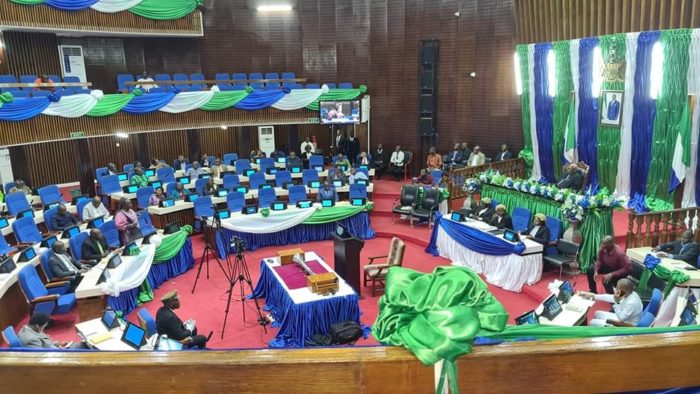Sierra Leone’s Constitution provides for a two-term limit for every President in section 40 of the constitution. Going by the provision, no President rules the country more for than 10 years either consecutive or not. Parliament however seems not to be in agreement with the clause which they intend to do away with in the near future. The constitutional amendment might not happen now owing to the exigency of time.
The house of representatives will be locked down in two weeks’ time making it difficult for the amendment to take place. The amendment process will however take effect in the next parliament whether President Julius Maada Bio wins again or not. Once that section of the law is amended, presidents can go in for as many terms as possible. No limit will exist at all.
If the mission is accomplished, Sierra Leone will adopt a political system akin to several countries whose constitutions do not have term limits. Constitutions of the Gambia and neighbouring Guinea do no have term-limits. Presidents can contest elections as much as it pleases them. It was the absence of such limitation that paved the way for President Alpha Conde’s third term in Guinea.
It was also the same political situation that obtained in the Gambia where President Yayah Jammeh ruled for 22 years (1994-2016). He left the seat of power after his defeat by President Adama Barrow. It is the same path Sierra Leone will tread if the constitutional amendment became successful. The introduction of the Proportional Representation (PR) system otherwise known as the District Block System is a move towards the constitutional amendment drive.
Once in the house, parliamentarians will be loyal and answerable only to their political parties and not their constituencies. They will be ever ready to respond to the demands of their parties and not the people. By all indication, it is clear under the PR system that only two political parties will contest when one looks at the 11.9 per cent threshold set by the Electoral Commission of Sierra Leone (ECSL).
National Grand Coalition, Unity Party, People’s Movement for Democratic Change, Alliance Democratic Party, People’s Democratic Party and others will not be in a position to contest owing to the threshold. They do not have the required resources and manpower to meet the ECSL target.
The ruling Sierra Leone People’s party (SLPP) and the main opposition, All People’s Congress (APC) are the only two that will have a way in parliament in the District Block System. The amendment has been one of the most topical issues among members of the public and in some higher quarters. A popular argument holds that the former President might come back if the move becomes successful. The deal, the public argued, is being worked out by Ernest Bai Koroma and President Julius Maada Bio.
If it holds, the APC flag-bearer, Dr Samura Kamara will not sail through in the coming elections as he only paves the way for Koroma’s second coming. For many Sierra Leoneans, Ernest’s seeming unwavered support for Samura is not for victory but for other latent purposes. In 2017, the former President selected Kamara to ensure a peaceful transition for which a prize of US$5m was set aside by the US government.
It is unclear whether Koroma gets that money. The top appointment Koroma got from AU/ECOWAS could not be divorced from the smooth transfer of power from APC to SLPP which he presided over. As AU/ECOWAS lead Elections Observer, he has monitored elections in seven African countries with Nigeria being the latest.
Apart from the emoluments he brings home for every election he observes, the former President has left a lasting impression on the minds of many Africans. It is also being argued that it was not out of love Koroma chose Kamara in 2017 convention in Makeni, but for another subtle reason. The former brought the latter owing to his docility.
Ernest knew quite well that he could easily prevail on Samura to keep low profile for the sake of peace after a defeat. It would have been a different outcome had the former President selected either Alpha Kanu or any of the other flag-bearers. The whole transition would have been a disaster had he made any erroneous choice. Arguments from other angles hold that former President Koroma does not intend to come back since he is highly opposed to a third-term bidding. Failure of the former President to observe elections in neighbouring Guinea is an evidence of resentment of third-term ambitions by incumbent Presidents.
However, such argument has been defeated by Koroma’s infamous constitutional review process led by Justice Edmond Cowan in 2013. The main reason for the review was to ensure a third term, political analysts say. The rejection of over 80% of Cowan’s recommendations is a testimony that the real objective is never achieved. The Koroma-led administration also made little effort to implement the recommendations leaving a workload for his predecessor.
The rejection of most of the recommendations and failure to implement generated a big question revolving around misuse of tax-payers’ money. In early 2022, President Bio released government’s ‘White Paper’ on the recommendations of the Constitutional Review Committee. No implementation was also done since the document went public.
The third term was also virtually absent in the recommendations, but there is strong hope that the deal would be done by the next parliament.


